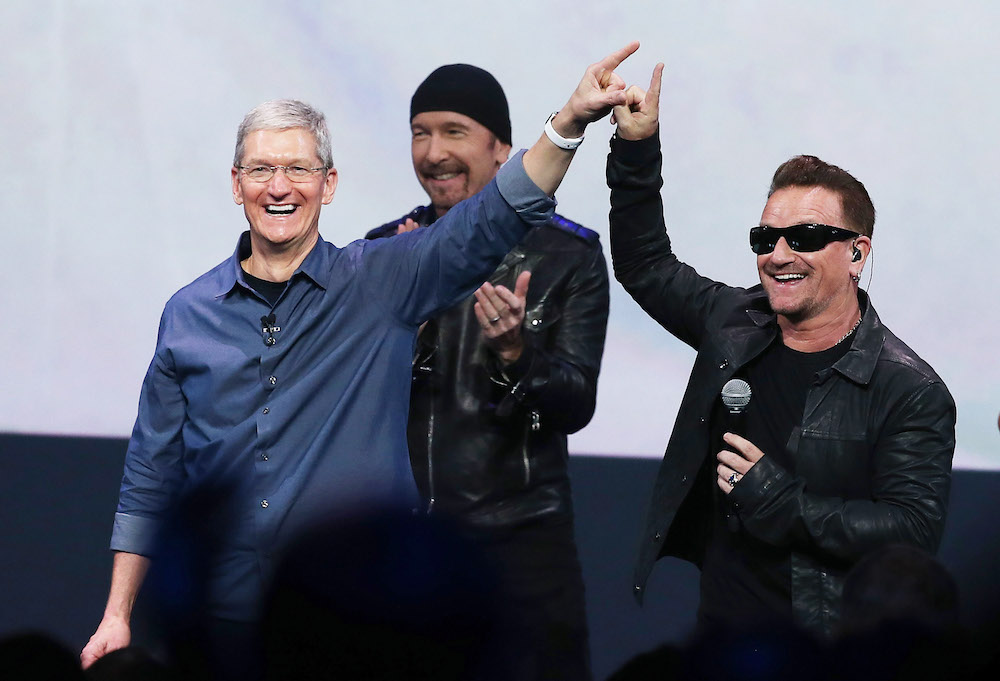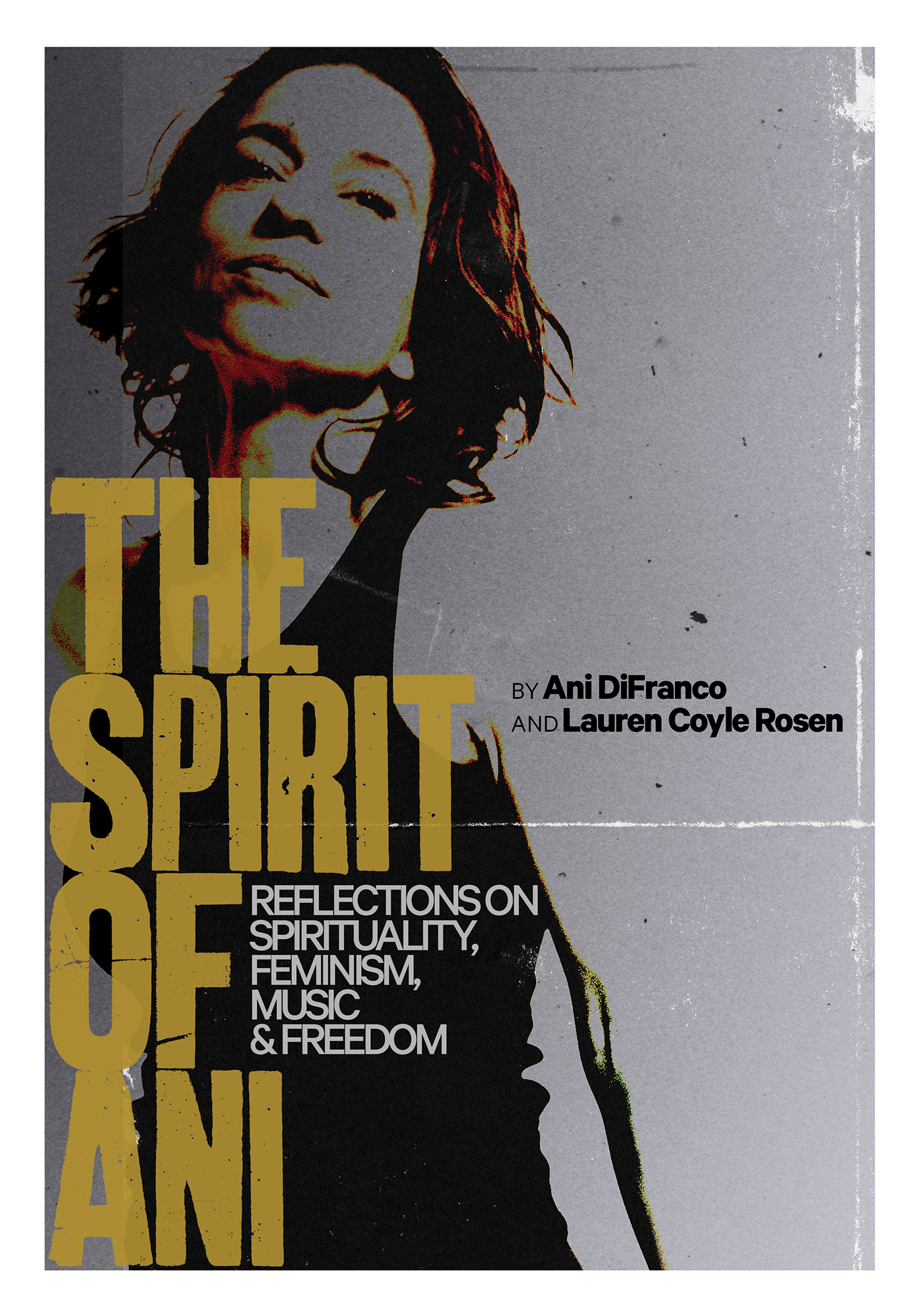Has there ever been an album so widely remembered without a single track most people would recognize?
When U2 first announced, at an Apple event 10 years ago today, that their new album Songs Of Innocence had magically appeared in every iTunes music library, my first reaction was: "Awesome! And creepy!" The general public identified more strongly with the latter sentiment. After years of struggle in the recording studio leading to multiple scrapped projects, U2 believed (a) that they'd recorded an album that hangs with their classics and (b) that the world would be grateful to have that album foisted upon them. Instead, among U2 fans, Songs Of Innocence was received as another merely OK chapter in the band's slow slide into mediocrity, and a lot of people outside the fan base were so offended at its presence on their phones that the album's quality (or lack thereof) became secondary to its status as one of the great modern PR flubs.
The road to Songs Of Innocence was long and arduous, and it unfolded at a moment when the band was fighting hard to remain a vital part of the mainstream landscape rather than accept their fate as a Stones-like legacy act whose new albums are just excuses to launch lucrative stadium tours. 2009's No Line On The Horizon had been the first U2 album that failed to enter into the zeitgeist in any meaningful way; 2004's How To Dismantle An Atomic Bomb at least had the Apple-abetted hit "Vertigo," but its career-best launch in the US (the album sold a whopping 840,000 copies in its first week) arguably had a lot to do with its status as the follow-up to 2000's back-to-basics success story All That You Can't Leave Behind. If you, like me, have no memory of "Get On Your Boots," count yourself blessed. The band was desperate to keep making pop hits, but starting with Atomic Bomb, which Bono billed as "our first rock album," they also became obsessed with rocking out in a way they rarely had in their glory days. The result was a misguided creative compass that led to a lot of cringe midlife-crisis rock from a band that had once pulled off both earnest anthems and ironic deconstructions that hit like anthems anyway.
In the aftermath of No Line On The Horizon, U2 wanted to create a "meditative" companion album called Songs Of Ascent that would work as a complement and an extension of the era like Zooropa had for Achtung Baby. But with U2 busy on the gargantuan 360° Tour and Bono and the Edge tied up with the music for the cursed Broadway musical Spider-Man: Turn Off The Dark, they weren't able to get the new U2 material where they wanted it. The inability to get over the hump would become a theme over the next few years as U2 worked with umpteen producers on multiple album projects, seemingly revising their plans every few months. At one point there was talk of a dance album with David Guetta, will.i.am, and RedOne that blessedly never saw the light of day. They even toyed with attempting to turn the Spider-Man songs into a U2 release.
Ultimately they settled in with Danger Mouse, the king of mid, for years of stop-start sessions that yielded uneven results. This led to further revisions with a cast of collaborators including dance-rock guy turned Adele producer Paul Epworth, their old pals Flood and Declan Gaffney, and Ryan Tedder, who has overseen countless hits and whose band OneRepublic specializes in antiseptic corporate rock. (At one point, Apple's Tim Cook cited them as his favorite band, which is just perfect.) By March 2014, Danger Mouse, who had long since turned his attention to his band Broken Bells, wasn't sure where work on the album stood or if he was even its producer anymore: "I have no idea what they're doing. I've been working on it for YEARS but I'm sure they're still working on the record."
All that striving led to an extremely generic album, polished but insubstantial. A decade later, Songs Of Innocence is not the turgid slog I remembered, but it's also hard to imagine how Bono believed he was adding to the lineage of U2 masterpieces. The soccer-chant hook and depth charge power chords of opening track "The Miracle Of Joey Ramone" make for a clunky exoskeleton, but there's a dynamic "Beautiful Day"-esque U2 song somewhere in there. "Every Breaking Wave" contains echoes of the inspirational uplift U2 made their name on, but Tedder's production turns the chorus into sparkling muzak. There are moments of intrigue, like "Sleep Like A Baby Tonight," with its wobbly synth foundation and dirty blues guitar, or "Raised By Wolves," a tense throwback to U2's early post-punk urgency. But mostly it's just a parade of tracks that sound like soulless U2 facsimiles, like what industry pros and worship pastors might come up with when tasked with capturing the band's signature sweeping grandeur.
I'm not sure it would have mattered whether the album was any good. In hindsight, the release method was always destined to overshadow the thing being released. When it was added to every iTunes account — which, in most cases, led to it automatically downloading onto people's iPhones and iPods — Songs Of Innocence immediately became an annoyance, a meme, and a symbol of an Orwellian future in which giant corporations crowd out music of your own selection with unwanted albums that are all but impossible to delete from your device. Musicians from Trent Reznor to Patrick Carney to Nick Mason agreed that the stunt had devalued music. But most people were just stunned by the hubris of assuming everyone would want a new U2 album in their library and frustrated that they couldn't figure out how to get rid of this thing that they never asked for. Wired called it "worse than spam," while the Washington Post opted for "dystopian junk mail." The backlash was so bad, and the deletion process so confusing, that Apple had to create a website explaining how to permanently purge Songs Of Innocence from your life.
Plenty of people who were put off by Bono's pompous public profile were giddy to witness his downfall, but perhaps even more painful for U2, the self-proclaimed biggest band in the world, was the reality that plenty of other people simply had no idea who they were. (There was, of course, a Who Is U2? Tumblr devoted to compiling the outrage and confusion on social media, as was the style in those days.) Eventually, the band had to admit they'd made a massive miscalculation. In his 2022 memoir Surrender: 40 Songs, One Story, Bono took responsibility for the debacle, absolving his bandmates, former U2 manager Guy Oseary, and the Apple braintrust:
I take full responsibility. Not Guy O, not Edge, not Adam, not Larry, not Tim Cook, not Eddy Cue. I'd thought if we could just put our music within reach of people, they might choose to reach out toward it. Not quite. As one social media wisecracker put it, "Woke up this morning to find Bono in my kitchen, drinking my coffee, wearing my dressing gown, reading my paper." Or, less kind, "The free U2 album is overpriced." Mea culpa.
A decade on from the chastening that was Songs Of Innocence, it seems like U2 have finally come to terms with their place in this world. They've mounted multiple massive tours commemorating their 1987 classic The Joshua Tree and opened the Sphere in Vegas with a residency centered on 1991's also-classic Achtung Baby. They've released just one collection of new music, 2017's Innocence companion piece Songs Of Experience, which was, of course, released in a strictly conventional manner. Their most recent album, last year's Songs Of Surrender, emerged in conjunction with Bono's book and featured reworkings of songs from throughout their career. These days they seem content to relive their glory days rather than try to repeat them, which feels like an appropriate posture for a bunch of grandfatherly men with a sterling back catalog. But even for a band in nostalgia mode, it seems safe to assume Songs Of Innocence is one chapter of U2's history the band would rather forget.
WHO THE HELL IS U2 & WHY DO I HAVE THEIR FULL ALBUM ON MY ITUNES
— rae (@forbiddenparade) September 14, 2014
We rely on reader subscriptions to deliver articles like the one you're reading. Become a member and help support independent media!






